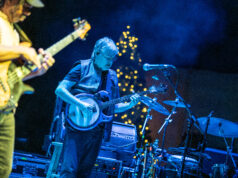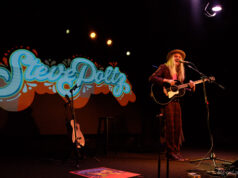 Anders Osborne (Photo by Brandt Vicknair)
Anders Osborne (Photo by Brandt Vicknair)
Anders Osborne cuts a unique figure on the musical scene. A native of Sweden, the longtime resident of New Orleans has become a fixture and even an elder statesman of that city’s music scene. As a performer, his own musical stylings hew strongly to the blues and R&B of his adopted city, with connections to the related jam band scene. (He often plays with Luther and Cody Dickinson’s Hill Country blues-meets-band jam band, The North Mississippi Allstars, as North Mississippi Osborne.)
As a songwriter — which has been, throughout his career, his principal employment — his greatest success has come through the Nashville country music establishment, where he was employed for decades as a staff songwriter, and commuted between the cities. In 2003, Tim McGraw’s cover of his “Watch The Wind Go By” reached number on the country charts.
Jackie Greene may be best known for his guitar work in recent incarnations of the Dead helmed by Phil Lesh, but he is, in addition to his work as a multi-instrumentalist, an accomplished singer-songwriter in his own right. While Greene is known foremost as an instrumentalist, and Osborne as a songwriter, the reality is that both are complete musicians, and they really showed when they played together at The Hamilton Live on Friday evening. These guys attract a lively crowd, and the pit was open; Anders said a few words before they started playing about being together and having a good time.
There can be something hokey about that kind of messaging sometimes, but there’s nothing hokey about Anders. He’s a real one, a guy who’s lived through some hard times, especially with substance abuse and mental health issues, and he’s shared his struggles. When Anders talks about coming together to play music, that communion, for him, is about something very deep and meaningful, about human connection and the sustenance of the spirit. You can feel him reaching out to the audience at every moment in his performance.
There were some very real moments in the show on May 27. After “Jacksonville to Wichita,” Anders shared how, earlier that day, his daughter had finally, after resisting for a long time, gotten her driver’s license. It wasn’t related to the song; it was just a moment of a proud father sharing something. It was real. Later, he addressed a young girl in the crowd, talking about his song “Flower Box.” He said, “[It’s] about where I grew up. The lyrics are about being yourself.” That’s a beautiful sentiment, one that any young person today would do well to hear.
Watch Anders Osborne perform “Flower Box” live for Gondola Sessions on YouTube:
After he’d given what I might call the opening invocation, sort of a call to prayer, Anders dedicated his first song, “Back on Dumaine,” to his friend John, who was celebrating 10 years sober. He’s written that songs like “Dumaine,” which he wrote by himself, are more personal and individualistic than the material he composed with partners in his Nashville work. For Anders’s songs, Jackie played piano, and opener Jonathan Sloane, a DC native, played acoustic guitar. During John’s opening set, he was joined by Anders and Jackie for his last two numbers, covers of Bob Dylan’s “Trying To Get To Heaven” and a Bobby “Blue” Bland song.
The set continued with “Walk By Myself,” then entered what I like to call the “geographic suite,” which consisted of songs about southern cities: “Jacksonville to Wichita” and “Tupelo”; “Lafayette” came later in the set. There’s a real sense of place in Anders music, whether it’s these cities a or his birthplace of Sweden in “Flower Box,” or his adopted home, in “My Girl From New Orleans” or “Back or Dumaine,” which name-checks a particular street in the Crescent City. You can almost picture those old streets, the particular and distinct urban scenery, as Anders delivers his lyrics.
Even beyond music, Anders belongs to a larger artistic tradition that also encompasses literature, that of immigrants expressing their love for America. As I was writing this piece, I found myself thinking about Garth Ennis’s Preacher — the comics, more than the TV show. Through the eyes and the words of the vampire Cassidy who, like the author, is Irish, we get an outsider’s view of and appreciation for this country. There’s something similar in Anders’ songs; he fell in love with this country and its music, and he chose to embrace it and celebrate it wholeheartedly, with all its flaws and warts. There’s something inspiring and beautiful about that. I was just born here, and never had to think about being an American; Anders’s music celebrates this country in a way that is deeper and more beautiful than most people born here will ever express.
A couple of Anders’s song fell into more general territory. “Ball and Chain” is a classic blues song about the things that hold us down, and “Buddha or the Blues” is a song about the dualities of life. “Life Don’t Last That Long” is a bit of a lament about the impermanence of things.
In the second half of the set, Jackie alternated songs with Anders; for his own songs, Jackie switched from the piano to his own acoustic guitar. “Recession Proof” talks about the endurance of the heart; “Don’t Let The Devil Take Your Mind” is a cautionary tale. You can probably guess what “Have Mercy” is about, and “Hallelujah” is most definitely not the Leonard Cohen song. The main set ended with a cover of Jerry Garcia’s “Don’t Let the Deal Go Down.” The three artists returned to the stage for their encore and played legendary bluesman Robert Johnson’s “From Four Till Late.” Anders mentioned getting Johnson’s recordings when he was 11 or 12. That concluded the show, which was a delightful night of compelling songs and camarederie.





